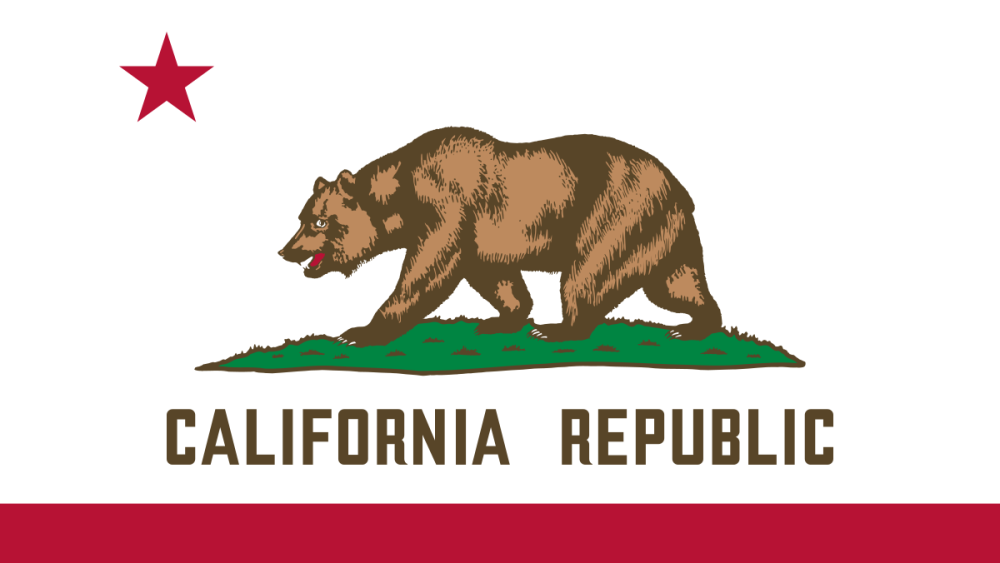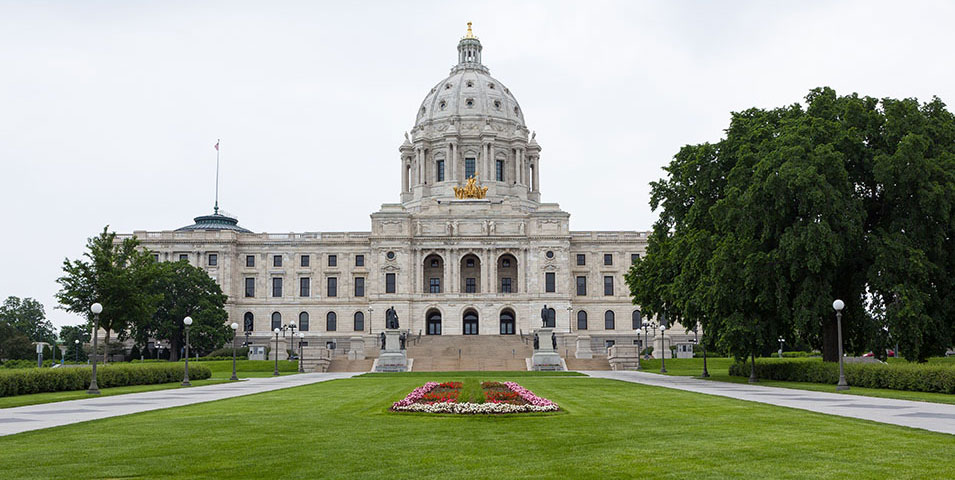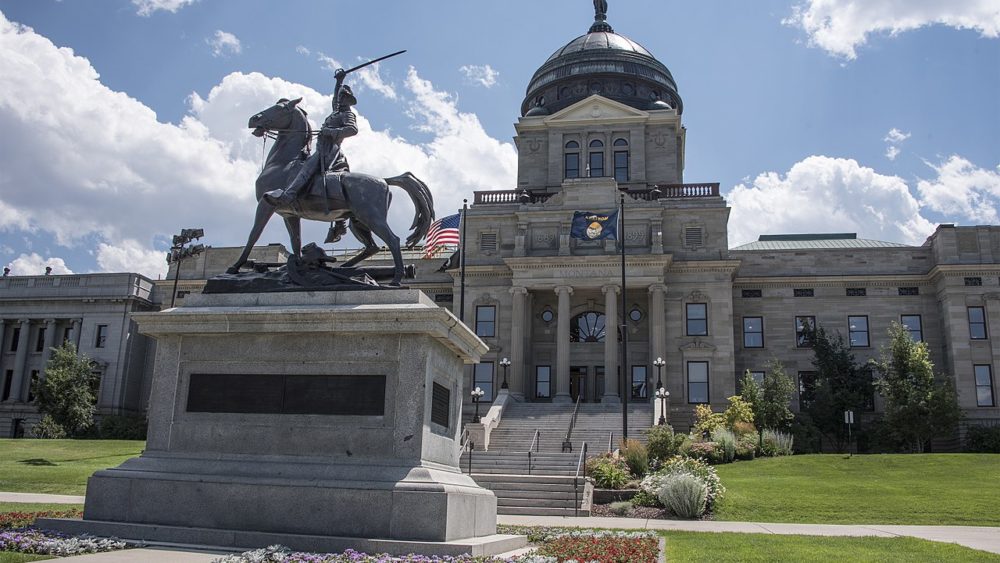
Cleveland City Hall - By: Erik Drost
Cleveland City Council passed an ordinance doubling campaign contribution limits for City Council candidates. Contribution limits to candidates for City Council increased from $1,500 to $3,000 for individuals and from $3,000 to $6,000 for PACs in a calendar year. Emergency […]
Cleveland City Council passed an ordinance doubling campaign contribution limits for City Council candidates.
Contribution limits to candidates for City Council increased from $1,500 to $3,000 for individuals and from $3,000 to $6,000 for PACs in a calendar year.
Emergency Ordinance No. 615-2024 will become effective immediately upon being signed by Mayor Justin Bibb, or in 10 days if not signed.
Bibb and all members of City Council are up for reelection in November 2025.
February 22, 2024 •
Ask the Experts – California Late Contribution Reports

Flag of California
Q: My employer makes corporate contributions in California. We have not yet exceeded $10,000 in calendar year 2024. The primary election is in March, along with the general election in the fall. If we decide to make contributions, when do […]
Q: My employer makes corporate contributions in California. We have not yet exceeded $10,000 in calendar year 2024. The primary election is in March, along with the general election in the fall. If we decide to make contributions, when do we have a late contribution report due?
A: The California “Late Contribution Report” [Form 497], sometimes referred to as the “24-hour report” is due during the 90-day period preceding any election if all of the following criteria are met:
- The contribution is $1,000 or more, or multiple contributions aggregating $1,000 or more, to a single candidate, ballot measure committee, or political party. This includes non-monetary and in-kind contributions;
- The corporation making the contribution must have already qualified as a major donor or the contribution made during the 90-day period before the election puts it over the $10,000 threshold and it becomes a major donor; and
- The recipient candidate or ballot committee must appear on the ballot at the election for which the 90-day period applies.
Contributions to political parties made during the 90-day period are also included. Contributions to PACs are not.
We are currently in the 90-day period for the March 5 primary election. The 90-day period for the November 5 general election begins August 7. Currently, no special elections are scheduled, but if one is, this triggers a new 90-day period. Check with the Fair Political Practices Commission for the exact dates of the 90-day period.
The filing requirements for Form 497 are:
- The report is due within 24 hours of making the contribution. The contribution is made on the date it is mailed, hand-delivered, or otherwise transmitted to the candidate, ballot measure committee, or political party.
- The report must be filed electronically with the California Secretary of State, Political Reform Division. No paper report is required.
- If a report is due on a Saturday, Sunday, or official state holiday, the 24-hour deadline is extended to the next business day. However, the Form 497 must be filed within 24 hours on a Saturday, Sunday, or an official state holiday when the report is due the weekend immediately prior to an election. For example, if a donor makes a contribution on the Saturday before the election, the Form 497 is due on Sunday.
As a reminder, the late contribution must still be reported on the next major donor report that is due. In 2024, major donor reports are due July 31 for the period covering January 1 to June 30; and January 31, 2025, for the period covering July 1 to December 31.
For more information, be sure to check out the “Registration and Reports Required” section of the U.S. Political Contributions Compliance Laws online publication for California. Please feel free to contact us if you have any questions.
January 8, 2024 •
Contribution Limits Increased in British Columbia

British Columbia Legislature
Campaign contribution limits increased in British Columbia, Canada, for 2024 to $1,450.82 for contributions to registered political parties, including their candidates, nomination contestants and registered constituency associations. Additionally, individuals can also contribute up to $1,450.82 to independent candidates and leadership […]
Campaign contribution limits increased in British Columbia, Canada, for 2024 to $1,450.82 for contributions to registered political parties, including their candidates, nomination contestants and registered constituency associations.
Additionally, individuals can also contribute up to $1,450.82 to independent candidates and leadership contestants, if a leadership contest is called in 2024.
The previous limit from 2023 was $1,401.40.
Also increased to $410 is the limit of a fee paid to attend a leadership convention or other convention of a political party without counting toward the $1,450.82 contribution limit.
These contribution amounts are adjusted at the start of each calendar year.
December 22, 2023 •
District Court Blocks Implementation of New Minnesota Campaign Finance Law

Minnesota Capitol Building
The U.S. District Court granted a motion for a preliminary injunction in Minnesota Chamber of Commerce v. Choi (0:23-cv-02015), preventing the Minnesota Campaign Finance and Public Disclosure Board from enforcing a bill restricting political activities by foreign-influenced corporations. House File […]
The U.S. District Court granted a motion for a preliminary injunction in Minnesota Chamber of Commerce v. Choi (0:23-cv-02015), preventing the Minnesota Campaign Finance and Public Disclosure Board from enforcing a bill restricting political activities by foreign-influenced corporations.
House File 3 was to be effective January 1, 2024, and would require a corporation making a contribution to a ballot question or an independent expenditure to submit a certification to the board that it was not a foreign-influenced corporation as of the date the contribution or expenditure was made.
The bill defines a foreign-influenced corporation as one for which a single foreign investor owns 1% or more; two or more foreign investors own 5% or more; or a foreign investor participates directly or indirectly in the corporation’s decision-making process with respect to the corporation’s political activities in the United States.
December 11, 2023 •
Montana Contribution Limits To Increase In 2024

Montana Capitol Building - gillfoto
The Commissioner of Political Practices published increases to the campaign contribution limits for the 2024-2025 election cycle. Individuals and PACs are able to contribute $1,120 per election to a candidate for governor and lieutenant governor; $790 per election to a […]
The Commissioner of Political Practices published increases to the campaign contribution limits for the 2024-2025 election cycle.
Individuals and PACs are able to contribute $1,120 per election to a candidate for governor and lieutenant governor; $790 per election to a candidate for statewide office; and $450 per election to a candidate for other public offices.
The previous limits were $1,000, $700, and $400.
Campaign limits have also increased for political party committees.
The new limits are applicable as of December 9, 2023.
May 31, 2023 •
Minnesota Legislature Adjourns Sine Die

Minnesota Capitol Building
The 93rd session of the Minnesota Legislature adjourned sine die on May 22. Lawmakers passed House File 3, a bill restricting political activities by foreign influenced corporations, and requiring corporations making political contributions to file certifications. The bill requires any corporation […]
The 93rd session of the Minnesota Legislature adjourned sine die on May 22.
Lawmakers passed House File 3, a bill restricting political activities by foreign influenced corporations, and requiring corporations making political contributions to file certifications.
The bill requires any corporation making a contribution to a ballot question or an independent expenditure to submit a certification to the Campaign Finance and Public Disclosure Board that it was not a foreign-influenced corporation as of the date the contribution or expenditure was made.
The bill also broadens the definition of expressly advocating to include certain types of political communications, even if they do not use words or phrases of express advocacy, such as “vote for” or “vote against.”
Expressly advocating is used to identify certain types of independent expenditures that require disclosure and reporting to the Campaign Finance and Public Disclosure Board.
The bill becomes effective January 1, 2024.
April 29, 2019 •
NYCU Video Digest – April 29, 20198
More ethics and campaign finance changes happening at the state level. Check out which states are making moves in today’s NYCU Video Digest!
More ethics and campaign finance changes happening at the state level. Check out which states are making moves in today’s NYCU Video Digest!
April 29, 2019 •
Washington Legislature Adjourns Sine Die
The Washington Legislature adjourned sine die April 28. During the 105-day legislative session, lawmakers passed House Bill 1195 amending the definitions of commercial advertiser and independent expenditure. House Bill 1195 requires independent expenditures to be reported electronically with the Public […]
 The Washington Legislature adjourned sine die April 28.
The Washington Legislature adjourned sine die April 28.
During the 105-day legislative session, lawmakers passed House Bill 1195 amending the definitions of commercial advertiser and independent expenditure.
House Bill 1195 requires independent expenditures to be reported electronically with the Public Disclosure Commission if the aggregate value of similar expenditures from the same source exceeds $1,000.
The Legislature also passed House Bill 1379 raising the threshold for identifying and disclosing the top five contributors of a political advertisement sponsored by a political committee from $700 to $1,000.
House Bill 1379 requires political advertisements to disclose the sponsor’s top five contributors and if any are political committees the sponsor must also disclose the top three donors to those contributors.
The bills have been delivered to the Gov. Jay Inslee to sign, veto part of it, or veto all of it.
April 29, 2019 •
Monday’s LobbyComply News Roundup
Campaign Finance National: Pete Buttigieg Swears Off the Lobbyist Money He Once Accepted by Jeremy Peters and Shane Goldmacher for New York Times Missouri: Columbia Developer Funnels Tens of Thousands Through Shell PACs to Lawmakers by Yue Yu (Columbia Missourian) […]
 Campaign Finance
Campaign Finance
National: Pete Buttigieg Swears Off the Lobbyist Money He Once Accepted by Jeremy Peters and Shane Goldmacher for New York Times
Missouri: Columbia Developer Funnels Tens of Thousands Through Shell PACs to Lawmakers by Yue Yu (Columbia Missourian) for KPVI
New Mexico: City Now Allows Online Donations for Candidates by Jessica Dyer for Albuquerque Journal
Ethics
National: Acting Defense Secretary Cleared of Wrongdoing in Probe of His ties to Boeing by Dan Lamothe and Missy Ryan for Washington Post
Maryland: Anne Arundel County Delegate Posts Advertisements, Tries to Sell Car on Official Social Media by Chase Cook for Capital Gazette
North Dakota: North Dakota Legislature Finalizes Ethics Bill, but ‘Safeguard’ Looms over Measure 1 Implementation by John Hageman (Forum News Service) for Dickinson Press
Tennessee: Feds to Sue Sen. Steve Dickerson and Other Pain Clinic Owners Over Fraud, Forgery Allegations by Brett Kelman for The Tennessean
Procurement
California: NRA Sues City of L.A. Over Its New Contract Disclosure Law by Dakota Smith for Los Angeles Times
April 26, 2019 •
News You Can Use Digest – April 25, 2019
National: Constraints on Presidency Being Redefined in Trump Era, Report Fallout Shows MSN – Ashley Parker and Josh Dawsey (Washington Post) | Published: 4/22/2019 The events that have followed the release of special counsel Robert Mueller’s report threaten to redefine […]

National:
Constraints on Presidency Being Redefined in Trump Era, Report Fallout Shows
MSN – Ashley Parker and Josh Dawsey (Washington Post) | Published: 4/22/2019
The events that have followed the release of special counsel Robert Mueller’s report threaten to redefine the legal and ethical standards that have long served as constraints on the American presidency. They also suggest that few, if any, of the traditional guardrails that have kept Donald Trump’s predecessors in check remain for this president and possibly those who will follow him. Current and former aides say they do not expect Trump to change his behavior, saying he is unlikely to be responsive to anything other than political pain in the form of a real revolt by Republican leadership or a sharp drop in poll numbers.
How the IRS Gave Up Fighting Political Dark Money Groups
ProPublica – Maya Miller | Published: 4/18/2019
“Dark money” spending is legal because of a massive loophole. Section 501(c)(4) of the U.S. tax code allows organizations to make independent expenditures on politics while concealing their donors’ names as long as politics is not the organization’s “primary activity.” The IRS has the daunting task of trying to determine when nonprofits in that category, known colloquially as C4s, violate that vague standard. But the IRS’ attempts to police this class of nonprofits have almost completely broken down. Since 2015, thousands of complaints have streamed in that C4s are abusing the rules. But the agency has not stripped a single organization of its tax-exempt status for breaking spending rules during that period. The IRS’ abdication of oversight stems from a trio of causes.
From the States and Municipalities:
Alabama – How a Lawyer, a Lobbyist and a Legislator Waged War on a Birmingham Superfund Site
AL.com – Steven Mufson (Washington Post) | Published: 4/24/2019
The Environmental Protection Agency (EPA) wanted to clean up toxic soil in the 35th Avenue Superfund site in Birmingham. The agency notified Drummond, a coal company, and four other manufacturers nearby that they would have to dig up and replace the soil on hundreds of residential yards. David Roberson, Drummond’s vice president and top lobbyist, worried it would cost his company $100 million or more. Roberson and his lawyer, Joel Gilbert, decided they needed someone who could persuade the people living on contaminated land to protest not the pollution, but the cleanup. They chose Oliver Robinson Jr. then a state representative. Prosecutors ultimately charged Robinson with receiving bribes, while Gilbert and Roberson were charged with bribery, conspiracy, and money laundering in the scheme to stop the EPA.
Alaska – As Capitol Reporters Dwindle, Alaska Lawmakers Grapple with Rise of Political Blogs
KTOO – Nat Herz | Published: 4/23/2019
The press corps in Juneau has a new addition this year: Jeff Landfield, a failed candidate for state Senate who is now running a colorful political blog called the Alaska Landmine. He is one of a growing number of political bloggers who are trying to fill in gaps left by Alaska’s shrinking mainstream media, posing challenges for both lawmakers and the bloggers themselves. Landfield was standing outside the chambers where the House meets recently, and he was getting some attention because he had a black eye. It was a souvenir, Landfield said, from when a legislative aide punched him a few days before at a Juneau bar.
Connecticut – Two Rival Politicians Accused Each Other of Using Drugs. The Result Was a Showdown at a Urinalysis Lab.
Washington Post – Antonia Noori Farzen | Published: 4/22/2019
Two feuding politicians in Bridgeport, Connecticut’s largest city, spent much of the past week accusing each other of being on mind-altering substances after getting into an ugly fight in the comments section of a local political blog. Bridgeport City Councilperson Ernest Newton and Board of Education member Maria Pereira concluded they could only settle their dispute one way: by challenging each other to a public drug test. Newton, whose political career was interrupted by a five-year prison sentence after he pleaded guilty to federal corruption charges, once struggled with an addiction to crack cocaine. Both tested negative for all 10 substances. But the feud did not die down.
Florida – Andrew Gillum Agrees to Pay $5,000 Ethics Fine
News Service of Florida – Tampa Bay Times | Published: 4/24/2019
Former Tallahassee Mayor and gubernatorial candidate Andrew Gillum agreed to pay a $5,000 fine to settle a complaint he violated state law by accepted gifts worth more than $100 from lobbyists or their clients who had interests in the city and failed to report them. The Florida Commission on Ethics agreed to drop four additional counts in the settlement. The commission had found probable cause that Gillum violated ethics laws for allegedly accepting gifts from Tallahassee entrepreneur Adam Corey and undercover FBI agents posing as developers. Corey had been a close friend of Gillum and lobbied city officials. The charges related to trips to Costa Rica and New York, a boat ride around the Statue of Liberty, and a ticket to the Broadway hit, “Hamilton.”
Florida – Opioid Lawsuit Bill Stalls in Florida Committee Chaired by Sister-in-Law of Walgreens Lobbyist
Tampa Bay Times – Lawrencwe Mower | Published: 4/22/2019
Florida Attorney General Ashley Moody is suing the nation’s largest drug makers and distributors, accusing them of recklessly supplying Floridians with millions of drugs per year. But a bill that is critical to the lawsuit moving forward has stalled in the committee of a powerful lawmaker: Sen. Lizbeth Benacquisto, who said her committee would not hear it because of concerns the bill could invade the privacy of patients. Benacquisto said her objections are not related to her brother-in-law, Chris Hansen, a lobbyist whose clients include Walgreens – one of the defendants in Moody’s lawsuit.
Maine – Numbers of Maine Lawmakers Who Went on to Lobby
AP News – Marina Villeneuva | Published: 4/21/2019
At least 14 Democratic and eight Republican lawmakers in Maine have gone on to register as paid lobbyists over the past three decades, a practice that is being targeted by a bill moving through the state Legislature. The House and Senate advanced a bill to ban future lawmakers from any paid lobbying within their first year out of office. The state ethics commissions had called for the change in 2017. The Associated Press (AP) compared state lobbying reports with legislative rosters and found that nearly half of the 22 former lawmakers who registered as lobbyists over the past three decades did so within the same year of leaving office. The lawmakers-turned-lobbyists have raked in $3.6 million in total compensation for their firms, according to the AP analysis.
Maryland – Federal Agents Search Baltimore City Hall and Mayor Catherine Pugh’s Home
Washington Post – Ann Marimow, Peter Hermann, and Lynh Bui | Published: 4/25/2019
Federal agents searched Baltimore City Hall and Mayor Catherine Pugh’s home among other sites amid fallout from lucrative children’s book deals she cut with businesses connected to the government she has run since 2016. Pugh took an indefinite leave of absence beginning April 1 attributed to health issues following criticism of the more than $700,000 she was paid for her self-published “Healthy Holly” book series. The book-deal revelations have led to calls from the city council and state lawmakers for Pugh’s resignation; an investigation by the state prosecutor; and to the firing of several of her aides. Investigators are scrutinizing Pugh’s deals with entities including Kaiser Permanente, which was awarded city contracts, and the University of Maryland Medical System, on whose board she sat for many years.
Massachusetts – Amid ‘Slush Fund’ Criticism, Nearly All Legislative Caucuses Will Forgo Outside Donations
Boston Globe – Matt Stout | Published: 4/24/2019
All but one of the nearly two dozen caucuses formed by Massachusetts lawmakers say they will not solicit outside contributions, weeks after a new internal rule allowing legislative groups to raise private funds stirred controversy on Beacon Hill. The rule, which requires all caucuses to register with the House Committee on Rules, also bars lobbyists from donating and says caucuses must receive approval from House counsel before taking any gift of more than $50. The potential of taking donations outside of campaign finance disclosure laws drew intense heat, including criticisms it could create a legislative “slush fund.”
Minnesota – Minnesota Lawmakers, Lobbyists Describe Cautious Capitol in Wake of #MeToo
Minneapolis Star Tribune – Jessie Van Berkel | Published: 4/21/2019
A year and a half after reports of sexual harassment rocked the Minnesota Legislature and prompted two resignations, lawmakers and lobbyists describe a changed atmosphere at the Capitol. People are more cautious and aware of what crosses the line. There is also a new group of House members, many of them younger women, who are outspoken about addressing harassment and gender equality. But some at the Capitol say they worry the good behavior and awareness will fall by the wayside if the energy of the #MeToo movement fades from the spotlight.
Missouri – Lobbyist’s Crusade to Change Title IX in Missouri Stems from His Son’s Expulsion
Kansas City Star – Edward McKinley | Published: 4/23/2019
After his son was expelled from Washington University last year through the school’s Title IX process, a leading Jefferson City lobbyist launched a campaign to change the law for every campus in the state. Richard McIntosh has argued to legislators that Title IX, the federal law barring sexual discrimination in education and mandating that schools set up internal systems to police sexual violence, is tilted unfairly against the accused. His proposals create more protections for those accused of Title IX violations. Had McIntosh’s amendment been enacted, it would have allowed his son to appeal the result of his hearing to the state Administrative Hearing Commission, where his mother and McIntosh’s wife is the presiding and managing commissioner.
South Dakota – S.D. House Speaker Paid $12,000 for Lobbyist’s Legal Fees
KELOLAND – Bob Mercer | Published: 4/23/2019
South Dakota House Speaker Steven Haugaard authorized a payment of $12,000 for a lobbyist’s legal fees after he banned her from the chamber floor, and South Dakota Municipal League Executive Director Yvonne Taylor’s attorneys have asked a federal judge to dismiss the league’s lawsuit against Haugaard. Court documents say Haugaard called Taylor into his office and brought up her column from the league’s magazine. In the article, which appeared prior to the June 2018 primary elections, Taylor suggested voters make a distinction between what she called “The Normals” and the “Wackies” in the Legislature. One sentence said: “We desperately need to get that ‘wacky ratio’ down.” A judge issued a temporary restraining order against Haugaard and said the speaker was not protected by legislative immunity.
Texas – Conservative Group Empower Texans Sues Lawmaker to Gain State House Media Credentials
Texas Tribune – Emma Platoff | Published: 4/18/2019
Months after being denied media credentials for the Texas House, the conservative organization Texas Scorecard – a product of Empower Texans, a Tea Party-aligned political advocacy group with one of the state’s best-funded PACs – filed a First Amendment lawsuit arguing its rejection from the chamber constitutes “unconstitutional viewpoint discrimination.” Before the legislative session began in January, two employees of Texas Scorecard applied for media credentials in the Legislature. In the Senate, their credentials were granted; in the House, they were denied. The two chambers follow similar rules about who is allowed special journalistic access to the floor, and both prohibit lobbyists. But the chambers’ political atmospheres are different.
Washington – A State Senator Said Nurses ‘Probably Play Cards’ at Work. Facing Mass Outrage, She’s Apologized.
Seattle Times – Allyson Chiu (Washington Post) | Published: 4/21/2019
While debating a bill that would give nurses uninterrupted meals and breaks at work and protect them from mandatory overtime, Washington Sen. Maureen Walsh arguing that hospitals in rural communities should be excluded from the measure because the requirements would place too much strain on those facilities. “By putting these types of mandates on a critical access hospital that literally serves a handful of individuals, I would submit to you that those nurses probably do get breaks – they probably play cards for a considerable amount of the day,” Walsh said. The comment sparked an online petition calling for her to shadow a nurse and “experience what really happens” during a 12-hour shift. The senator’s office has also been flooded with angry phone calls and emails as well as packages containing decks of playing cards.
April 25, 2019 •
Thursday’s LobbyComply News Roundup
Campaign Finance Pennsylvania: “Ex-Reading Mayor Vaughn Spencer Sentenced to Eight Years in Prison in Case Tied to Allentown Corruption” by Peter Hall for Allentown Morning Call Ethics National: “Trump Says He Is Opposed to White House Aides Testifying to Congress, […]
 Campaign Finance
Campaign Finance
Pennsylvania: “Ex-Reading Mayor Vaughn Spencer Sentenced to Eight Years in Prison in Case Tied to Allentown Corruption” by Peter Hall for Allentown Morning Call
Ethics
National: “Trump Says He Is Opposed to White House Aides Testifying to Congress, Deepening Power Struggle with Hill” by Robert Costa, Tom Hamburger, Josh Dawsey and Rosalind Helderman (Washington Post) for MSN
National: “Six Trump Interior Appointees Are Being Investigated for Possible Ethical Misconduct” by Juliet Eilperin and Dino Grandoni (Washington Post) for MSN
National: “Divided on Impeachment, Democrats Wrestle with Duty and Politics” by Sheryl Gay Stolberg and Nicholas Fandos for New York Times
Alabama: “How a Lawyer, a Lobbyist and a Legislator Waged War on a Birmingham Superfund Site” by Steven Mufson (Washington Post) for AL.com
Alaska: “Lawmakers Strike Compromise on Scaling Back Conflict of Interest Restrictions” by Andrew Kitchenman for KTOO
Florida: “Andrew Gillum Agrees to Pay $5,000 Ethics Fine” by News Service of Florida for Tampa Bay Times
Pennsylvania: “Ex-Sheriff John Green Admits Taking Bribes: ‘I have betrayed the confidence’ of Philly citizens” by Jeremy Roebuck for Philadelphia Inquirer
Washington: “A State Senator Said Nurses ‘Probably Play Cards’ at Work. Facing Mass Outrage, She’s Apologized.” by Allyson Chiu (Washington Post) for Seattle Times
Legislative Issues
Alaska: “As Capitol Reporters Dwindle, Alaska Lawmakers Grapple with Rise of Political Blogs” by Nat Herz for KTOO
Lobbying
South Dakota: “S.D. House Speaker Paid $12,000 for Lobbyist’s Legal Fees” by Bob Mercer for KELOLAND
April 24, 2019 •
Wednesday’s LobbyComply News Roundup
Campaign Finance North Carolina: “Dan Forest Corrects Report to Show a Donation from Greg Lindberg” by Paul Specht for Raleigh News and Observer Ethics National: “Constraints on Presidency Being Redefined in Trump Era, Report Fallout Shows” by Ashley Parker and […]
 Campaign Finance
Campaign Finance
North Carolina: “Dan Forest Corrects Report to Show a Donation from Greg Lindberg” by Paul Specht for Raleigh News and Observer
Ethics
National: “Constraints on Presidency Being Redefined in Trump Era, Report Fallout Shows” by Ashley Parker and Josh Dawsey (Washington Post) for MSN
National: “Supreme Court’s Conservatives Appear Likely to Let Trump Add Citizenship Question to 2020 Census” by Robert Barnes and Mark Berman for Washington Post
Colorado: “Investigation into One Lobbyist’s Actions Raises Questions About Workplace Harassment Policy at The Capitol” by Bente Birkeland for Colorado Public Radio
Connecticut: “Two Rival Politicians Accused Each Other of Using Drugs. The Result Was a Showdown at a Urinalysis Lab.” by Antonia Noori Farzen for Washington Post
Maryland: “Baltimore City Council to Weigh New Ethics Rules and Limits on Mayoral Power Amid Healthy Holly Controversy” by Ian Duncan and Kevin Rector for Baltimore Sun
New Hampshire: “Financial Disclosure Bill Stalls in Senate” by David Solomon for Manchester Union Leader
Lobbying
National: “K Street Gets Behind Mayor Pete Buttigieg” by Kate Ackley for Roll Call
Florida: “Opioid Lawsuit Bill Stalls in Florida Committee Chaired by Sister-in-Law of Walgreens Lobbyist” by Lawrencwe Mower for Tampa Bay Times
April 23, 2019 •
Tuesday’s LobbyComply News Roundup
Campaign Finance Tennessee: “Senate Approves Bill to Double Campaign Contribution Limits to Members of Upper Chamber” by Joel Ebert for The Tennessean Ethics National: “Trump Sues in Bid to Block Congressional Subpoena of Financial Records” by David Fahrenthold, Rachael Bade, […]
 Campaign Finance
Campaign Finance
Tennessee: “Senate Approves Bill to Double Campaign Contribution Limits to Members of Upper Chamber” by Joel Ebert for The Tennessean
Ethics
National: “Trump Sues in Bid to Block Congressional Subpoena of Financial Records” by David Fahrenthold, Rachael Bade, and John Wagner for MSN
National: “The Go-To Lawyer for Governors Facing Impeachment” by Alan Greenblatt for Governing
Illinois: “Ex-Top Aide to Dorothy Brown Goes on Trial on Charges of Lying About Pay-to-Play Allegations” by Rosemary Sobel and Jason Meisner for Chicago Tribune
Minnesota: “Minnesota Lawmakers, Lobbyists Describe Cautious Capitol in Wake of #MeToo” by Jessie Van Berkel for Minneapolis Star Tribune
Oregon: “Oregon Officials Approve $50,000 Ethics Case Settlement with Cylvia Hayes” by Ben Botkin for Salem Statesmman Journal
Lobbying
Louisiana: “Numbers of Maine Lawmakers Who Went on to Lobby” by Marina Villeneuva for AP News
Redistricting
Missouri: “Missouri GOP, Fighting Redistricting Changes, Courts Unlikely Ally: Black Democrats” by Jason Hancock for Kansas City Star
April 22, 2019 •
Georgia Raises Contribution Limits
Last week, the Government Transparency and Campaign Finance Commission voted to raise contribution limits. For statewide elected offices the contribution limits raised from $6,600 to $7,000 for primary and general elections. Primary and general runoff elections limits were raised from […]
 Last week, the Government Transparency and Campaign Finance Commission voted to raise contribution limits.
Last week, the Government Transparency and Campaign Finance Commission voted to raise contribution limits.
For statewide elected offices the contribution limits raised from $6,600 to $7,000 for primary and general elections.
Primary and general runoff elections limits were raised from $3,900 to $4,100 for statewide elected offices.
Contribution limits for all other offices were also raised from $2,600 to $2,800 for primary and general elections and from $1,400 to $1,500 for primary and general runoff elections.
The previous contribution limits had not changed since 2016.
State and Federal Communications, Inc. provides research and consulting services for government relations professionals on lobbying laws, procurement lobbying laws, political contribution laws in the United States and Canada. Learn more by visiting stateandfed.com.

